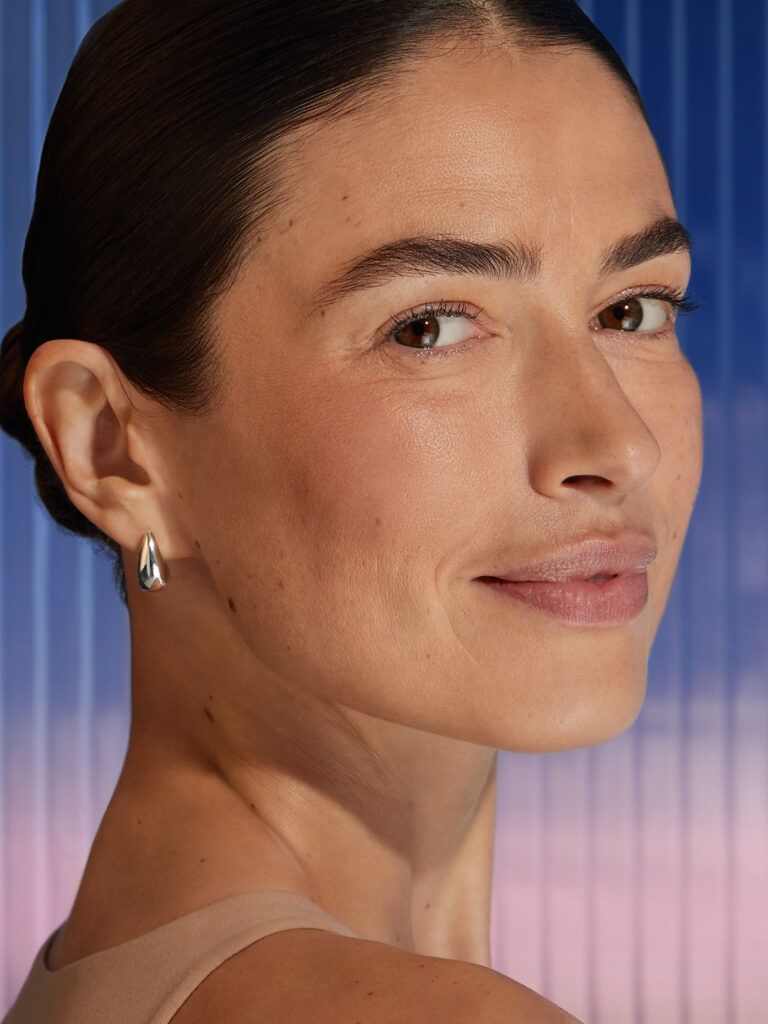
Illustration: Ada Tuncer
Stories
To Ozempic Or Not Ozempic?
A mid-size dietitian’s thoughts on the new weight-loss drug taking the world by storm.
Text Esen Boyacıgiller
Ozempic. Have you heard of it? Surely you have. You know the TikTok trend, ‘How often do men think of the Roman Empire?’* My Roman Empire is Ozempic. I think about it at least once a day. ‘What happens now?’ ‘How will this affect my industry?’ ‘Will it last?’ ‘What happens in a year?’ ‘In 10?’
For those who are not familiar, Ozempic is a semaglutide, or GLP-1 (glucagon-like peptide-1), which is a naturally occurring hormone in the body that helps lower blood sugar levels after eating. Ozempic mimics this hormone.
These medications, which are injectables, have been in use for diabetics for about a decade. However, scientists noticed an interesting side effect of taking these medications: patients lost weight. A lot. As of a few months ago, Ozempic was approved for use as a weight loss medication. Those with a Body Mass Index (BMI) of over 30 and a BMI of 25 who also have other health issues like high cholesterol or blood pressure or polycystic ovary syndrome (PCOS) are eligible for the medicine.
The drugs are very effective. Ozempic produces about a 5-10% weight loss in one year, and Mounjaro, which is even stronger, produces up to 20%.
This is incredible. I am a registered dietitian working in nutrition and helping people lose weight for over 10 years. I myself am Patient 1. I have been on and off diets since college. I know a thing or two about dieting!
Diets don’t seem to work too well. While there is an oft-repeated statistic that 80% of people who lose weight gain it back, we don’t actually know how effective diets are because studies only follow patients for a set period of time, people drop out of studies for various reasons, and it is possible that those who lose weight most effectively are not enrolling in such studies.
Still, many millions are unable to keep the weight off long-term, and we are losing the fight against obesity. 60% of Americans will be obese by 2030. And this isn’t just an American problem. According to Fikret Bayraktar, the general Obesity Secretary of the National Congress, the rate of obesity in Turkey has jumped from 22% in 1998 to 31% today. WHO reports Turkey is the fattest country in Europe.
The reasons are many. I see it every day in my work. Access to food, food education, time, money, motivation, big food, food advertising, loneliness, isolation, convenience; so many things have created this perfect storm we find ourselves in today.
Enter Ozempic.
I have been following the Ozempic discourse for months. I have read every single article I can get my hands on; I have read the Reddits and watched all the Tiktoks. The most striking response to taking the injectable is that it suddenly and drastically reduces what we call ‘food noise.’ If you are a lifelong dieter like me, you know it. It’s the incessant voice in your head saying, ‘Eat more. Get a cookie. What’s for dinner? I ate too much. I ate too little.’ And so forth. All. day. Long. It is exhausting. Scientists posit that overweight people have more ‘food noise’ than thin ones. I believe this food noise contributes to people failing their diets.
Okay, here is the good: Patients on Ozempic report that it is so much easier to eat well when you aren’t obsessed with thinking about food. The medications cause delayed gastric emptying, which means you are fuller longer. You naturally eat less. Patients are more motivated to workout. Their clinical labs improve. Many patients are reporting decreased interest in other compulsive behaviors like drinking and smoking. The medication is even effective at reducing cardiac events. Ozempic is truly amazing.
Now for the bad. As you can imagine, the biggest issue with a medication that produces significant weight loss is that it’s rife for abuse. Many people who do not need it are taking it. Celebrities are using it to lose weight and being deceitful about it (I’m looking at you, Khloe Kardashian!), which is creating unrealistic standards. Many people who are only slightly overweight at 10-15-20 lbs are getting their hands on it, whether legally or not, and taking it. Significantly reducing your food intake when already thin is dangerous and can lead to many problems, including malnourishment. We don’t know the long-term effects of these medications, and because you are losing weight rapidly, you are also losing muscle mass. If these patients choose to go off of it, with the decreased muscle mass on their bodies, it will be that much harder to keep the weight off.
It is also extremely expensive, as insurance won’t cover it for many people unless you are obese or diabetic. It is, of course, much cheaper in Turkey, but taking it forever would surely add up financially.
The side effects, including nausea, vomiting, constipation, fatigue, and gastric reflux, can be extreme, though most report they eventually fade.
We have been working towards a more body-positive world for years now. It has gotten so much better. More brands are producing clothes for plus sizes. The media is featuring more plus-size models and actors. Gen Z seems to be growing up in a much more forgiving and accepting time (vs. the time period I grew up when Kate Moss-waif was in). This is good. We all come in different shapes and sizes, as I tell the kids I work with. Some of us are just genetically predisposed to being larger (having overweight parents gives you an 80% chance of being overweight). Some of us eat healthy and exist at weights that would be considered overweight by the outdated BMI tool. Body acceptance is important, surely. People argue that you can’t be healthy with a bigger body. That is simply not true. You cannot tell if someone is healthy by looking at them.
So I worry that Ozempic has produced a situation where everyone can be thin. If everyone can be thin, should everyone be thin?
Influencer Remi Bader spoke about trying Ozempic for binge eating, stopping it, and gaining back twice the weight. She said her cravings post-Ozempic were overwhelmingly strong. When you lose a lot of weight quickly, your body thinks you are starving and will work its damnedest to get back to that weight.
It is worth mentioning you do not have to go off Ozempic, and just like statins for cholesterol, you should be able to stay on it forever, say doctors. If you do go off, however, studies show patients regain ⅔ of the weight lost. We don’t yet have research on those who stay on it for life.
So as you can see, it’s not so black and white. It is a personal choice. I believe it is a game-changer for seriously obese patients whose daily lives are affected by existing in such a large body. But not everyone wants to be thin. This is unbelievable in Turkey, a country I find incredibly fatphobic. But there are indeed many, probably millions, who are happy to exist in larger bodies, and that’s their prerogative.
Would I take it? As a mid-sized dietitian, I barely qualify. I have always struggled with food, and it’s one reason I went into dietetics. I have thought about it a lot. But to me, it just feels like cheating. I know I can lose weight and have many times before. I also don’t want to experience those side effects. One of my friends who is on it and loves it says, ‘Esen, give this to yourself. You don’t have to work so hard.’ Perhaps, but for now, the side effects are simply not worth those extra pounds for me. But that’s me.
Will obesity become a thing of the past, thanks to Ozempic? Who knows. Only time will tell.





